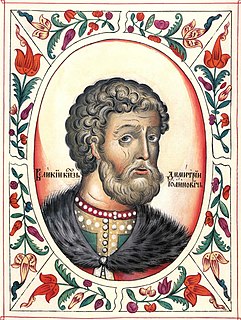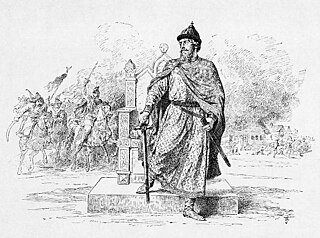 W
WGrand Prince Alexander or Aleksandr Mikhailovich was a Prince of Tver as Alexander I and Grand Prince of Vladimir-Suzdal as Alexander II. His rule was marked by the Tver Uprising in 1327. Aleksandr Mikhailovich was executed in the Golden Horde together with his son Fyodor.
 W
WAndrey III Alexandrovich, a Russian prince, son of Alexander Nevsky, received from his father the town of Gorodets on the Volga. In 1276 he added Kostroma to his possessions and joined the struggle for the Grand Duchy of Vladimir-Suzdal.
 W
WAlexander Yaroslavich Nevsky served as Prince of Novgorod, Grand Prince of Kiev and Grand Prince of Vladimir (1252–63) during some of the most difficult times in Kievan Rus' history.
 W
WAndrei I Yuryevich, commonly known under his sobriquet Andrei the Pious, was Grand prince of Vladimir-Suzdal from 1157 until his death. His reign saw a complete decline of Kiev's rule over northeastern Rus, and the rise of Vladimir as the new capital city. Andrei was known in the West as Scythian Caesar, and is canonized as a saint in the Russian Orthodox Church.
 W
WDmitri Konstantinovich of Suzdal was a powerful Prince of Suzdal and Nizhny Novgorod who dominated Russian politics during the minority of his son-in-law, Dmitri Donskoi. The famous Shuisky family descends from his eldest son, Vasily Kirdyapa.
 W
WDmitry Mikhaylovich of Tver, nicknamed The Fearsome Eyes, was a Grand Prince of Tver and Grand Prince of Vladimir. He was a son of Mikhail of Tver and Anna of Kashin.
 W
WSaint Dmitry Ivanovich Donskoy, or Dmitry of the Don, sometimes referred to simply as Dmitry, son of Ivan II the Fair of Moscow (1326–1359), reigned as the Prince of Moscow from 1359 and Grand Prince of Vladimir from 1363 to his death. He was the first prince of Moscow to openly challenge Mongol authority in Russia. His nickname, Donskoy, alludes to his great victory against the Tatars in the Battle of Kulikovo (1380), which took place on the Don River. He is venerated as a Saint in the Orthodox Church with his feast day on 19 May (O.S.), or June 1.
 W
WIvan I Daniilovich Kalita was Grand Duke of Moscow from 1325 and Vladimir from 1332.
 W
WIvan II Ivanovich the Fair was the Grand Prince of Moscow and Grand Prince of Vladimir in 1353. Until that date, he had ruled the towns of Ruza and Zvenigorod. He was the second son of Ivan Kalita, and succeeded his brother Simeon the Proud, who died of the Black Death.
 W
WKonstantin Vsevolodovich was the eldest son of Vsevolod the Big Nest and Maria Shvarnovna.
 W
WMikhail Yaroslavich, also known as Michael of Tver, was a Prince of Tver who ruled as Grand Prince of Vladimir from 1304 until 1314 and again from 1315–1318. He was canonized and counted among the saints of the Russian Orthodox Church.
 W
WMikhalko Yuryevich, Prince of Torchesk (mid-1160s–1173), Vladimir and Suzdal (1175–1176) and Grand Prince of Kiev.
 W
WDmitry Alexandrovich was Grand Prince of Vladimir-Suzdal from 1276 until 1281 and then from 1283 until 1293.
 W
WSimeon Ivanovich Gordiy was Prince of Moscow and Grand Prince of Vladimir. Simeon continued his father's policies aimed to increase the power and prestige of his state. Simeon's rule was marked by regular military and political standoffs against the Novgorod Republic and the Grand Duchy of Lithuania. His relationships with neighboring Russian principalities remained peaceful if not passive: Simeon stayed aside from conflicts between subordinate princes. He had recourse to war only when war was unavoidable. A relatively quiet period for Moscow was ended by the Black Death that claimed the lives of Simeon and his sons in 1353.
 W
WSviatoslav Vsevolodovich of Vladimir was the Prince of Novgorod and Grand Prince of Vladimir-Suzdal (1246–1248).
 W
WThe Grand Duke of Vladimir was a prince during the Kievan Rus' and after its collapse. He ruled territory approximately bounded by the Volga, Oka and Northern Dvina rivers. Its capital was Vladimir during 1157-1238. Vladimir city was founded by a Kievan prince Vladimir Monomakh in 1108 and was destroyed by a Mongol invasion in 1238. The second important city was Suzdal', also destroyed by Mongols. The Grand Duke Yuri Dolgorukii, the seventh son of Vladimir Monomakh, began the lineage of Suzdal' and Vladimir-Suzdal' great princes. Vladimir-Suzdal' began the next consolidation of Russian lands, completed by Muscovy, which grew from within Vladimir-Suzdal.
 W
WVsevolod III Yuryevich, or Vsevolod the Big Nest (1154–1212), was the Grand Prince of Vladimir during whose long reign (1177–1212) the city reached the zenith of its glory.
 W
WYaroslav II, Christian name Theodor (Феодо́р) was the Grand Prince of Vladimir (1238–1246) who helped to restore his country and capital after the Mongol invasion of Russia.
 W
WPrince Andrey II Yaroslavich was the third son of Yaroslav II who succeeded his uncle Svyatoslav III as the Grand Duke of Vladimir in 1249. Three years later, he challenged the Mongols and was ousted by them from Russia.
 W
WYuri II, also known as George II of Vladimir or Georgy II Vsevolodovich, was the fourth Grand Prince of Vladimir who presided over Vladimir-Suzdal at the time of the Mongol invasion of Rus'.
 W
WYuriy Danilovich, also known as Georgiy Danilovich was Prince of Moscow (1303–1325) and Grand Prince of Vladimir.